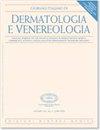临床实践中慢性自发性荨麻疹的治疗管理:一项试点调查的结果。
IF 2
Q3 Medicine
Giornale Italiano Di Dermatologia E Venereologia
Pub Date : 2020-11-01
DOI:10.23736/S0392-0488.20.06761-9
引用次数: 0
摘要
背景:慢性自发性荨麻疹(CSU)患者的治疗方法在卫生保健专业人员之间存在差异,并且可能受到许多因素的影响。目的本横断面调查旨在评估临床实践中医生对CSU治疗管理的态度。方法对来自意大利不同地区的对CSU有专业兴趣的医生(n=21) (a组)和在临床活动中偶尔处理CSU的医生(n=25) (B组)进行研究特异性问卷调查。结果在标准剂量的第二代抗组胺药无效的情况下,两组的大多数医生总是或经常开高剂量的相同药物。B组的64%和A组的三分之一通常会将剂量增加一倍。A组14%的调查参与者和B组24%的调查参与者从未在临床实践中使用过老一代抗组胺药,其余医生报告很少或偶尔使用。全体性皮质类固醇的处方在b组医生中更为常见。关于难治性CSU使用替代药物的问题在两组之间产生了不同的答案。费用和进入专家参考中心的机会被认为是使用非抗组胺药物的最重要障碍。结论:这些初步结果表明,CSU的治疗方法在临床实践中似乎是异质的,至少在一定程度上可能受到医生通常工作的不同医疗环境的制约。本文章由计算机程序翻译,如有差异,请以英文原文为准。
Therapeutic management of chronic spontaneous urticaria in clinical practice: results from a pilot survey.
BACKGROUND
The therapeutic approaches to patients with chronic spontaneous urticaria (CSU) differ among health care professionals and may be influenced by many factors.
OBJECTIVES
This cross-sectional survey was aimed at evaluating physicians' attitudes regarding therapeutic management of CSU on clinical practice.
METHODS
A study-specific questionnaire was administered to a group of physicians (n=21) with a specialist interest in CSU from different areas of Italy (Group A) and also to other physicians (n=25) who manage CSU only occasionally in their clinical activity (Group B).
RESULTS
In case of ineffectiveness of second-generation antihistamines at standard doses, higher doses of the same drug were always or frequently prescribed by most physicians in both groups, and 64% in group B and one third in group A usually increased the dose up to twice. Old-generation antihistamines were never used in clinical practice by 14% of survey participants in group A and 24% in group B, with the remaining physicians reporting rare or occasional uses. The prescription of systemic corticosteroids appeared to be more common among physicians in group B. The question concerning the use of alternative drugs in refractory CSU produced different answers between the two groups. Costs and access to specialist reference centers were indicated as the most important barriers to the use of medications different from antihistamines.
CONCLUSIONS
These preliminary results suggest that therapeutic approaches to CSU seem to be heterogeneous in clinical practice and could be at least in part conditioned by the different medical settings where physicians usually work.
求助全文
通过发布文献求助,成功后即可免费获取论文全文。
去求助
来源期刊

Giornale Italiano Di Dermatologia E Venereologia
DERMATOLOGY-
CiteScore
1.90
自引率
0.00%
发文量
0
审稿时长
6-12 weeks
期刊介绍:
The journal Giornale Italiano di Dermatologia e Venereologia publishes scientific papers on dermatology and sexually transmitted diseases. Manuscripts may be submitted in the form of editorials, original articles, review articles, case reports, therapeutical notes, special articles and letters to the Editor.
Manuscripts are expected to comply with the instructions to authors which conform to the Uniform Requirements for Manuscripts Submitted to Biomedical Editors by the International Committee of Medical Journal Editors (www.icmje.org). Articles not conforming to international standards will not be considered for acceptance.
 求助内容:
求助内容: 应助结果提醒方式:
应助结果提醒方式:


